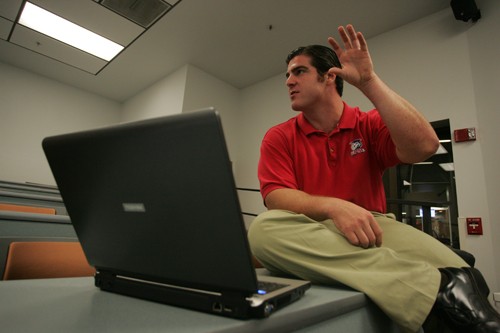A bill of rights for graduate students, still in its infancy, will face a long road full of bureaucratic challenges before it can become legally binding university policy, officials said.
The bill, originally passed by the Graduate and Professional Student Council in September 2008, was dropped due to confusion between the GPSC and the Graduate Council, a faculty body charged with handling policy decisions and grievances, said Andrew Carnie, a linguistics professor and chair of the Graduate Council.
One problem, he said, was that the bill did not clarify that some of its policies already existed in other university documents such as the employee handbook and the Arizona Board of Regents policy document. Graduate College deans requested that the document be split into a statement of rights and a statement of responsibilities and identify content that was already extant in other documents.
What exactly happened to the bill after that remains unclear, but since then graduate student leaders have maintained that the bill has faced resistance from administrators.
Many faculty members question the need for a graduate student bill of rights, James Johnson, an optical sciences doctoral student and GPSC assembly chair, said at GPSC’s Sept. 30 meeting.
“”This is going to be an uphill battle for us,”” he said.
Nevertheless, Carnie called the bill very important and said that after the bill was returned to the GPSC, “”(The UA) Transformation hit us all, and I think it just got lost.””
Adding to the difficulty of resolving such issues is the fact that GPSC leadership turns over every semester, he said.
A small group of former and current GPSC members met Sept. 3 to decide on an unofficial working version of the bill — largely unchanged from the 2008 version — to use in an Oct. 13 forum with President Robert Shelton.
The next step is for the bill to be passed by the GPSC. President David Talenfeld, a second-year law student, said he has made the bill a top priority for his tenure as president.
The bill is “”absolutely central to my legacy,”” he said.
Next, the bill will need to be approved by both the Graduate Council and the Faculty Senate, Carnie said, after which it will head to the Office of General Counsel and finally to the president.
There is a pressing need for such a document, said Dianne Horgan, associate dean of the Graduate College and an organizer of the Graduate Council.
At the moment, it can be difficult for graduate students to know where to turn when they have questions, complaints or concerns, a problem that could be alleviated by a cohesive bill of rights, she said.
“”There shouldn’t be a dispute,”” Horgan said. “”It’s a matter of how students want information presented.””
Horgan and Carnie said that the bill would provide a much-needed opportunity to update a mentoring handbook for graduate students distributed by the Graduate Council, which, Carnie said, “”desperately needs to be revised.””
As momentum gathers for the bill, many of the key players in the approval process, including Shelton, have said they are supportive of the project.
“”David (Talenfeld) has indicated that this is a real priority for him, so we’ve made it a real priority for us too,”” Carnie said.









